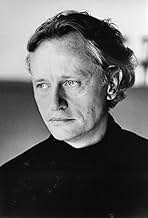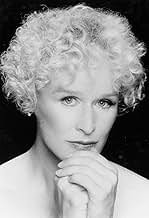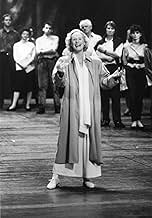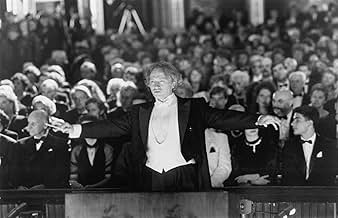AVALIAÇÃO DA IMDb
6,6/10
1,5 mil
SUA AVALIAÇÃO
Adicionar um enredo no seu idiomaHungarian conductor plans bold "Tannhäuser" production amid opera politics, artistic egos, nationalism, union conflicts, and funding challenges in critique of Grand Opera and European Union.Hungarian conductor plans bold "Tannhäuser" production amid opera politics, artistic egos, nationalism, union conflicts, and funding challenges in critique of Grand Opera and European Union.Hungarian conductor plans bold "Tannhäuser" production amid opera politics, artistic egos, nationalism, union conflicts, and funding challenges in critique of Grand Opera and European Union.
- Direção
- Roteiristas
- Artistas
- Prêmios
- 3 vitórias e 2 indicações no total
Johara Farley
- Dancer
- (as Johara Racz)
Dieter Rita Scholl
- Delfin Van Delf
- (as Rita Scholl)
- Direção
- Roteiristas
- Elenco e equipe completos
- Produção, bilheteria e muito mais no IMDbPro
Avaliações em destaque
This film is much more than a customary movie about opera, though opera lovers get first-rate extracts from Wagner's Tannhauser as well. The action takes place in an imaginary "Opera Europe" in Paris. István Szabó, the excellent film director is really interested here in fanatic people of the theater who came from several countries of Europe to unite their talent in order to create a successful performance of Wagner's youthful masterpiece. The ensemble is a mixture of multinational people: the head of the company (a Spaniard, a former hero of the Spanish Civil War,) her private secretary and mistress (descendant of a noble Russian family,) the conductor (a talented young Hungarian who suffers from inferiority complex because of his East-block origin,) the singer who plays Tannhauser (a permanently offended dumpy man from the DDR with beautiful voice,) the French theatrical technician (a pig headed trade unionist who causes much trouble,) etc. They carry with themselves all good and vicious habits and traditions of their origin which cause many conflicts but humorous episodes as well during the rehearsals. There is a remarkable scene when at a dinner party the protagonists put aside all of their conflicts and sing together a song called "Suliko" which was once Stalin's favorite. (They sing it not because they love Stalin, but because of a certain nostalgia for their youth.) In the center of the story stands the Hungarian conductor's and a Nordic singer's (played by Glenn Close) stormy love affair which ends in diminuendo (using here deliberately this term of music.) Strongly recommended for everyone who loves art and theater.
I saw this last night on UK TV. Glenn Close looked the part as a diva.
Her mouthing of Kiri Te Kanawa's singing was stunning. I've seen Elizabeth Schwarzkopf and Victoria de los Angeles sing, from the front row, and I would have believed this to be real thing, had it not been a movie.
I can only imagine that Te Kanawa recorded it after Close has shot the scenes. Otherwise, Close is a wonderful mimic.
Anyway, I was charmed by the movie. Simplistic it may be. But then so was Shakespeare in Love. And, as there, a miracle happens when the curtain goes up (except that there was no curtain at the Globe and here it doesn't actually go up, which is where the miracle happens).
David
Her mouthing of Kiri Te Kanawa's singing was stunning. I've seen Elizabeth Schwarzkopf and Victoria de los Angeles sing, from the front row, and I would have believed this to be real thing, had it not been a movie.
I can only imagine that Te Kanawa recorded it after Close has shot the scenes. Otherwise, Close is a wonderful mimic.
Anyway, I was charmed by the movie. Simplistic it may be. But then so was Shakespeare in Love. And, as there, a miracle happens when the curtain goes up (except that there was no curtain at the Globe and here it doesn't actually go up, which is where the miracle happens).
David
A marvelous film that anyone with an interest in classical music will enjoy - be they an opera lover or hater. Excellent bravura performances by Close and Arestrup conjure up a heady mix of artistic temperament, the politics of "The Arts" and great music. It is great fun. The film is exuberantly directed and the pace never lets up. A triumph for Director Victor Szabo.
this movie, besides giving the casual viewer a glimpse into the operatic world, also affords the viewer a casual glimpse into the world and the business, of music making, and it ain't pretty. but it's accurate.
as a professional musician in an international setting for more than 25 years, let me assure you that the evils of the music business are all here on display, and they are represented accurately: complaining musicians, managers for whom the word 'know' was replaced by the word 'no' at an early age (perhaps in their infancy), smarmy interfering union reps, and please God, save us all from short conductors with bleeping inferiority complexes.
and then there are the operatic singers. oh my!! (dr. georg szell called opera singers, " 'unmusical beasts', who have to have every note beaten into them by a vocal coach". this is true, by my experience).
the only really weak moment that i noticed was when the conductor left the podium during a rehearsal to knock on the door of the singer. this is absolutely improbable/impossible in my experience. conductors get their 'power' by being on the podium. they do not leave the podium
orchestra conducters get/force sex by more sordid means, not by leaving the podium.
this movie has a lot to recommend it, on many different levels- check it out.
i give it a 9.2.
watch it in a 'Robert Altman' frame of mind, i think that you will see what i mean.
it's not 'terror in tiny town'. and it's not, 'the godfather, part one'. it's somewhere in between. it's really a fine movie.
thanks. alvink
as a professional musician in an international setting for more than 25 years, let me assure you that the evils of the music business are all here on display, and they are represented accurately: complaining musicians, managers for whom the word 'know' was replaced by the word 'no' at an early age (perhaps in their infancy), smarmy interfering union reps, and please God, save us all from short conductors with bleeping inferiority complexes.
and then there are the operatic singers. oh my!! (dr. georg szell called opera singers, " 'unmusical beasts', who have to have every note beaten into them by a vocal coach". this is true, by my experience).
the only really weak moment that i noticed was when the conductor left the podium during a rehearsal to knock on the door of the singer. this is absolutely improbable/impossible in my experience. conductors get their 'power' by being on the podium. they do not leave the podium
orchestra conducters get/force sex by more sordid means, not by leaving the podium.
this movie has a lot to recommend it, on many different levels- check it out.
i give it a 9.2.
watch it in a 'Robert Altman' frame of mind, i think that you will see what i mean.
it's not 'terror in tiny town'. and it's not, 'the godfather, part one'. it's somewhere in between. it's really a fine movie.
thanks. alvink
I've seen this movie many times now. It covers most of the things that is evident in an opera house and productions. Though some of the sceneries, dramatic situations are slightly exaggerated, I still think it is well achieved attempt to recreate typical scenes of an opera production, love stories, conflicts with opera managers, strikes, problems with orchestral musicians and singers, corrupt non-environmental cooperation sponsors, Paris and Budapest cultural milieus.
But there is some small flaws. Erland Josephson who plays Picabia (General Director of Opera Europa) is a great actor but he doesn't do it all well with his Spanish pronunciation and pronounces Karin in with real Swedish accent. Otherwise he's portraying the role of with absolute perfection.
Glenn Close is simply marvelous as the Swedish soprano and Niels Arestrup as Maestro Szanto is very credible in his role as the conductor.
The music from Tannhäuser by Richard Wagner works as a third character in this movie, same function as the other movie Amadeus (1984) by Milos Forman. I would recommend anyone to see this movie, to simply enjoy it over a nice evening!!
But there is some small flaws. Erland Josephson who plays Picabia (General Director of Opera Europa) is a great actor but he doesn't do it all well with his Spanish pronunciation and pronounces Karin in with real Swedish accent. Otherwise he's portraying the role of with absolute perfection.
Glenn Close is simply marvelous as the Swedish soprano and Niels Arestrup as Maestro Szanto is very credible in his role as the conductor.
The music from Tannhäuser by Richard Wagner works as a third character in this movie, same function as the other movie Amadeus (1984) by Milos Forman. I would recommend anyone to see this movie, to simply enjoy it over a nice evening!!
Você sabia?
- CuriosidadesOpera singer Kiri Te Kanawa dubbed the singing voice of lead actress Glenn Close.
- Citações
Zoltan Szanto: I could mix up my work with my private life.
- Trilhas sonorasTannhäuser
(extraits)
Music by Richard Wagner
Performed by Kiri Te Kanawa, René Kollo, Håkan Hagegård, Waltraud Meier,
Renate Spingler, Matthias Hölle, Kim Begley, Robin Leggate, Rodney Macann,
, Roderick Earle with The Philharmonia Orchestra (as London Philharmonia Orchestra)
Conducted by Marek Janowski
Principais escolhas
Faça login para avaliar e ver a lista de recomendações personalizadas
- How long is Meeting Venus?Fornecido pela Alexa
Detalhes
- Data de lançamento
- Países de origem
- Idiomas
- Também conhecido como
- Meeting Venus
- Locações de filme
- Empresas de produção
- Consulte mais créditos da empresa na IMDbPro
Bilheteria
- Faturamento bruto nos EUA e Canadá
- US$ 1.000.348
- Fim de semana de estreia nos EUA e Canadá
- US$ 65.715
- 17 de nov. de 1991
- Faturamento bruto mundial
- US$ 1.000.348
Contribua para esta página
Sugerir uma alteração ou adicionar conteúdo ausente


























